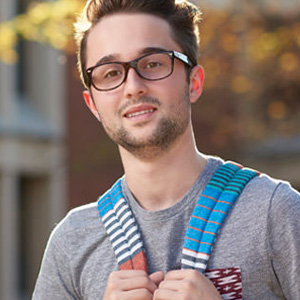Enter a Career Helping Others with Their Mental Health
Embrace your passion for helping others by pursuing an associate of applied science (AAS) in behavioral health support at St. Louis Community College. This training will equip you with the skills necessary to improve the quality of life and recovery for children and adults with mental illness and their families through support, education and advocacy.
Community support work is all about lending a helping hand by encouraging clients to make informed choices, be involved in decisions and have control over their lives. This assistance connects an individual to society, strengthens our ties with the people, making it a better place for us to live.
"I've always had a passion for helping others, and the time just felt right for me to follow my heart and get into a helping profession. For me, STLCC has been the perfect fit because it has provided a variety of experiences that have deepened my knowledge and strengthened my resolve to help others."
- Kathy Flynn, AAS, 2020
What is Behavioral Health Support at St. Louis Community College?
STLCC's associate in applied science in behavioral health support degree was developed in cooperation with the Missouri Department of Mental Health and the Missouri Behavioral Health Council. The Division of Behavioral Health (DBH) manages programs and services for people who need help for mental illness or substance use disorders. Services available are evaluation, intervention, treatment, rehabilitation, recovery support, family support, prevention, education and mental health promotion.
Our hands-on programs prepares you for a wide range of employment opportunities in state, county and local mental health agencies as well as substance use facilities, schools and more.
"[Graduates] come in prepared to hit the ground running with the practical skills necessary to perform the job well and a much better understanding of the needs of the population, along with a strong understanding to work with people as human beings first and foremost."
- Jennifer Higginbotham, MSW, LCSW
Chief Program Officer, Independence Center

What Can You Do with a Behavioral Health Support Associate Degree?
You'll be in high demand with an associate in applied science degree. Workforce shortages, inadequate access to timely and affordable mental health care, and reduced stigma have created an abundance of new jobs in mental health support. Graduates can begin work as a community support specialist.
These professionals are essential when it comes to locating and arranging support services for clients in need. Their role can best be described as liaisons, working with clients struggling with physical and mental disabilities, mental illness and substance abuse, or specific populations like children, veterans, immigrants, former prison inmates or the homeless.
They serve as an excellent source of support and guidance for individuals who are struggling to navigate independent living while managing a mental or physical disability, mental illness or other challenge. Thanks to the work of community support specialists, clients in need receive vital services that empower them and improve their lives.
AAS in Behavioral Health Support
- Degree offered: Associate in applied science
- Locations: Florissant Valley, Forest Park
- Hours to complete: 61
- Program contact name: Jenna Mueller
- Program contact email: jmueller258@stlcc.edu
- Program contact number: 314-644-9268
Tuition for district residents is $122 per credit hour for in-district students. Find out more about our straightforward and low-cost tuition structure.
Accreditation
St. Louis Community College is designated by the Division of Behavioral Health as a behavioral support program associate of applied science and accredited by the Higher Learning Commission. All College degree programs are approved by the Missouri Department of Higher Education and Workforce Development.
Why You Should Choose STLCC's Behavioral Health Support Program

Exclusive Grant Financial Support Options
Take advantage of additional financial support for AAS in behavioral health support students. The Fast Track Workforce Incentive Grant supports education for employment in high-demand industries.

Select a One-of-a-Kind Program
STLCC leading the way by offering an associate in applied science in behavioral health support. STLCC's program gets you started helping people with mental health and other issues sooner.

Employment Opportunities Abound
Missouri has over 500 new job openings in mental health every year.

A Wide Range of Opportunities
Become qualified to work in state, county and local human service agencies, substance use disorder facilities, community mental health centers, hospitals, schools and more.
STLCC. What's your reason?